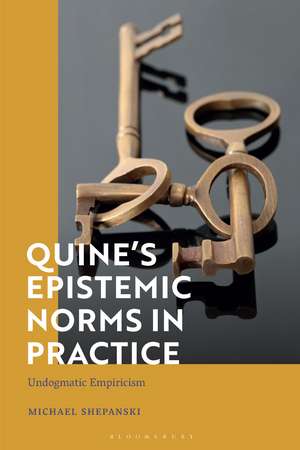Quine’s Epistemic Norms in Practice: Undogmatic Empiricism
Autor Michael Shepanskien Limba Engleză Hardback – 26 iul 2023
Preț: 509.69 lei
Preț vechi: 730.77 lei
-30% Nou
Puncte Express: 765
Preț estimativ în valută:
97.54€ • 101.22$ • 81.53£
97.54€ • 101.22$ • 81.53£
Carte tipărită la comandă
Livrare economică 17-31 martie
Livrare express 08-14 februarie pentru 118.42 lei
Preluare comenzi: 021 569.72.76
Specificații
ISBN-13: 9781350304260
ISBN-10: 1350304263
Pagini: 200
Dimensiuni: 156 x 234 x 19 mm
Greutate: 0.46 kg
Editura: Bloomsbury Publishing
Colecția Bloomsbury Academic
Locul publicării:London, United Kingdom
ISBN-10: 1350304263
Pagini: 200
Dimensiuni: 156 x 234 x 19 mm
Greutate: 0.46 kg
Editura: Bloomsbury Publishing
Colecția Bloomsbury Academic
Locul publicării:London, United Kingdom
Caracteristici
Investigates epistemic norms and sheds new light on the philosophy of W. V. Quine
Notă biografică
Michael Shepanski is Adjunct Lecturer of Philosophy at Charles Sturt University, Australia.
Cuprins
Preface Acknowledgements Part I. Undogmatic Empiricism 1. Wanted: A Normative Epistemology in Working Order2. Epistemological Dissociative Disorder3. Empiricism Without (Even Mentioning) the Dogmas 4. Conservatism is not a Third Norm 5. Sufficient Logical Explicitness is Norm Zero Part II. Application to Philosophy 6. Touching Base 7. The Armchair8. Adapting to Predicate Logic Part III. Case Study: Propositional Attitude Ascriptions 9. Destination and Horizon 10. Sententialism 11. From Sententialism to Russellianism 12. Sententialism with Non-Designating Names Part IV. Paths Not Taken 13. The "Two Dogmas" Argument14. Naturalized Epistemology 15. Attitudes to Sets of Possibilia 16. The Mythical Given 17. Epistemology as the Theory of Knowledge NotesBibliography Index
Recenzii
Starting from a clear exposition of Quine's views, Shepanski develops an elegant and useful epistemology of his own. Written with personality and rigor, this is an enjoyable and intriguing read.
